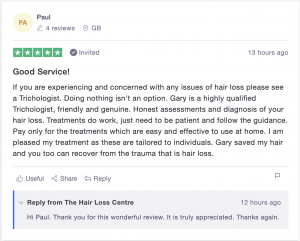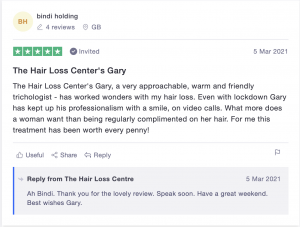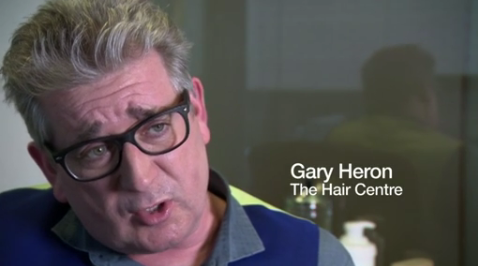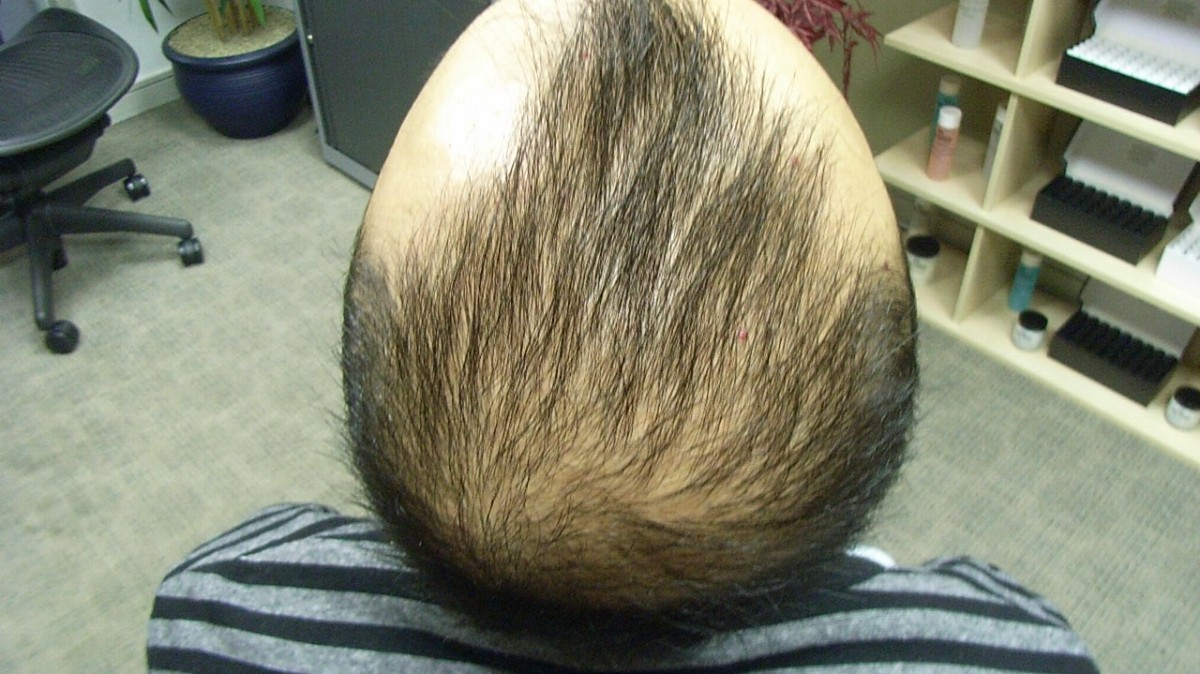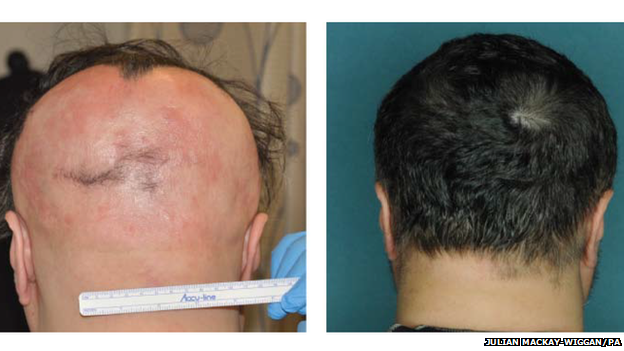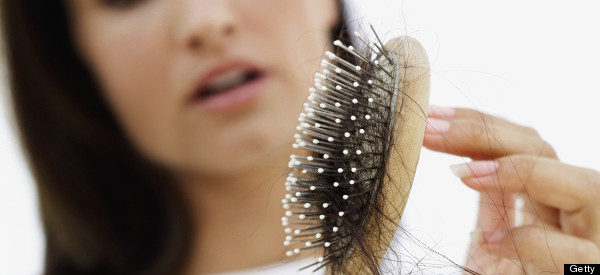Blog
The Hair Centre – BBC feature
13.03.2017 in UncategorizedThe Hair Centre was featured in a news programme on Monday 13th March at 1.30pm. You can watch the video on BBC’s website below:
http://www.bbc.co.uk/news/uk-england-london-39232849
no comment
Hair loss reversed in alopecia areata sufferers
18.08.2014 in UncategorizedPeople saw their hair fully restored after just five months of treatment (right)|
Scientists have completely reversed hair loss in three people by giving them a drug normally used to treat bone marrow disorders.
The patients had alopecia areata – a condition that can cause severe, patchy baldness that is difficult to treat.
But after five months of taking the medication ruxolitinib, all three saw total hair re-growth.
The findings from Columbia University Medical Center are published in the journal Nature Medicine.
‘Devastating disease’
Alopecia areata affects around two in every 1,000 people in the UK and is thought to be caused by the immune system attacking hair follicles.
The US scientists had previously identified a set of immune cells involved in the destruction of hair and conducted a number of successful trials in mice.
They then gave three patients with moderate to severe alopecia areata a twice daily dose of ruxolitinib.
This medication is already approved for use in bone marrow conditions in the United States and European Union.
All three patients had lost at least a third of their hair but saw dramatic hair growth within five months of therapy.
Lead researcher Dr Raphael Clynes said: “We’ve only begun testing the drug in patients, but if the drug continues to be successful and safe, it will have a dramatic positive impact on the lives of people with the disease.”
Prof David Bickers, a dermatologist at Columbia University who has treated many patients with the disease, said: “There are few tools in the arsenal for the treatment of alopecia areata that have any demonstrated efficacy.
“This is a major step forward in improving the standard of care for patients suffering from this devastating disease.”
Researchers say more work is now needed to see if the drug can be offered more widely.
Alopecia areata can occur at any age but is most often seen in teenagers and young adults.
It is not related to the more common male-pattern hair loss that is thought to be driven by hormones.
Scientists say as the mechanisms behind this condition are different, the therapy is less likely to prove effective for this more common problem.
“Why buy hair loss treatments over the counter or on the internet when you can see The Hair Centre Trichologist for FREE and know that you are guaranteed results”
Do you have Hair Loss Problems, read our Hair Loss Help
no comment'Nerdy' Swede wins faux – Nobel after green-hair find
17.09.2013 in UncategorizedOriginal Article – Click Here
A Swedish researcher has won the lg Nobel Prize for improbable research after he solved the mystery of why people’s hair was inexplicably turning green in southern Sweden last year.
Johan Pettersson, an environmental engineer from Trelleborg, was awarded the parody prize at Harvard University in Boston on Thursday.
“My children say that it’s only their dad who can win such a prize. They really think I’m a bit of a nerd,” he told Sveriges Television (SVT).
” A Swede who had previously won the prize called me to tell me. It was extremely overwhelming and he had to ring twice so it would sink in.”
Petterson’s discovery came after several formerly blonde inhabitants of Anderslov in southern Sweden suddenly had green hair.
The engineer came to the conclusion that it was the copper pipes that were to blame, as they weren’t properly coated in the new houses.
Hot water being left in the pipes overnight caused the copper to seep into the water system, leaving the tap water with five times as much copper as usual.
As copper has a naturally green dying effect, any residents in new houses in the area who showered using the tap water found they suddenly had green hair.
According to the prize’s official website, the lg Nobel Prizes honour achievements that first make people laugh then think.
“The prizes are intended to celebrate the unusual, honor the imaginative – and spur people’s interest in science, medicine and technology.”
no commentStress Hair Loss – Are You At Risk?
07.06.2013 in UncategorizedWhen Nadine Dorries spoke out about her alopecia on Daybreak earlier this week, she referred to the condition as a “confidence stealer”.
Although we don’t quite agree that it’s vastly different for men than it is for women – she said on the show that -“When men go bald and when they lose their hair, what they tend to do is have a mid-life crisis and go out and have an affair, but what women tend to do is to actually go into their houses and lock the door” – she did shine a spotlight on an issue that is often embarrassing and difficult to talk about.
Dorries isn’t completely sure what has caused her alopecia, and there are several types. Androgenic alopecia is the standard male and female pattern baldness, while traction alopecia is caused by pressure to the hair, so if the hair is tied up too tightly or held tightly in a wrapper of cloth.
There are some types of alopecia however, which are linked to stress, which is anagen effluvium, where it occurs three months after a stressful event, like a bereavement or emotional stress, and alopecia areata, when the hair falls out quite quickly and in a circular pattern.
Gary Heron, Head of Practice and former alopecia sufferer at The Westminster Practice spoke to the HuffPost UK Lifestyle about how stress can affect your hair. He said “It fluctuates from recession to recession, we have seen more alopecia areata across the board, which are stresses from recession in 2007. We’re seeing more aggressive cases too, where there’s around 20-30% hair loss, which is a lot. If you’re stressed out, your auto immune system runs completely flat, the stress builds up, and if you’re the kind of person who implodes rather than explodes, you’re more likely to get it”.
He adds “It’s also immune system related and genetic related, so in groups of a family, one might have asthma, one might have eczema and another alopecia. If your boats are lined up the wrong way you might be prone to it”.
- Baldness linked to heart disease in men
- Chinese ‘hair addict’ trend is very worrying
According to Gary, alopecia barbae – which affects a man’s beard – is definitely on the increase simply because more men are growing beards these days. It might sound obvious, but if you are stressed out, or are noticing hair loss, here are the following tips that can make life a lot easier:
1. Take a long, hard look at your diet. If you’re vegetarian, you want to make sure that you are supplementing your diet with protein you might not get otherwise. Gary remarked on a woman who was cooking really well for her family but then spent so much time running around that she ate really poorly herself.
2. There isn’t enough time in the day to do everything, but that’s what tomorrow is for. Sounds obvious, but prioritise what needs to be done today, and don’t beat yourself with a proverbial stick if you can’t finish it all.
3. Gary recommends the ‘Churchill method’ of sitting down with a pen and paper and writing down all the good and bad things in your life. Then making an effort to tackle the bad.
4. If you have alopecia and your hair is starting to grow back, don’t unduly stress yourself by worrying the hair will stay fine and thin. It takes time.
5. Don’t force yourself to go out if you are feeling rubbish, but similarly don’t hide away either. Confide in your close friends who will be able to keep things in perspective for you, and more importantly, take your mind off the matter.
6. Lastly, if you are suffering bad hair loss, as in the pattern is turning from a circle to an exclamation mark, then make an appointment with a trichologist who might be able to point out the triggers setting it off.
Click here for the original article on Huffington Post.
Choose from the following Hair Stimulants:
For treatments that work without any side effect read:
Do you have Hair Loss Problems, read our Hair Loss Help
no comment






